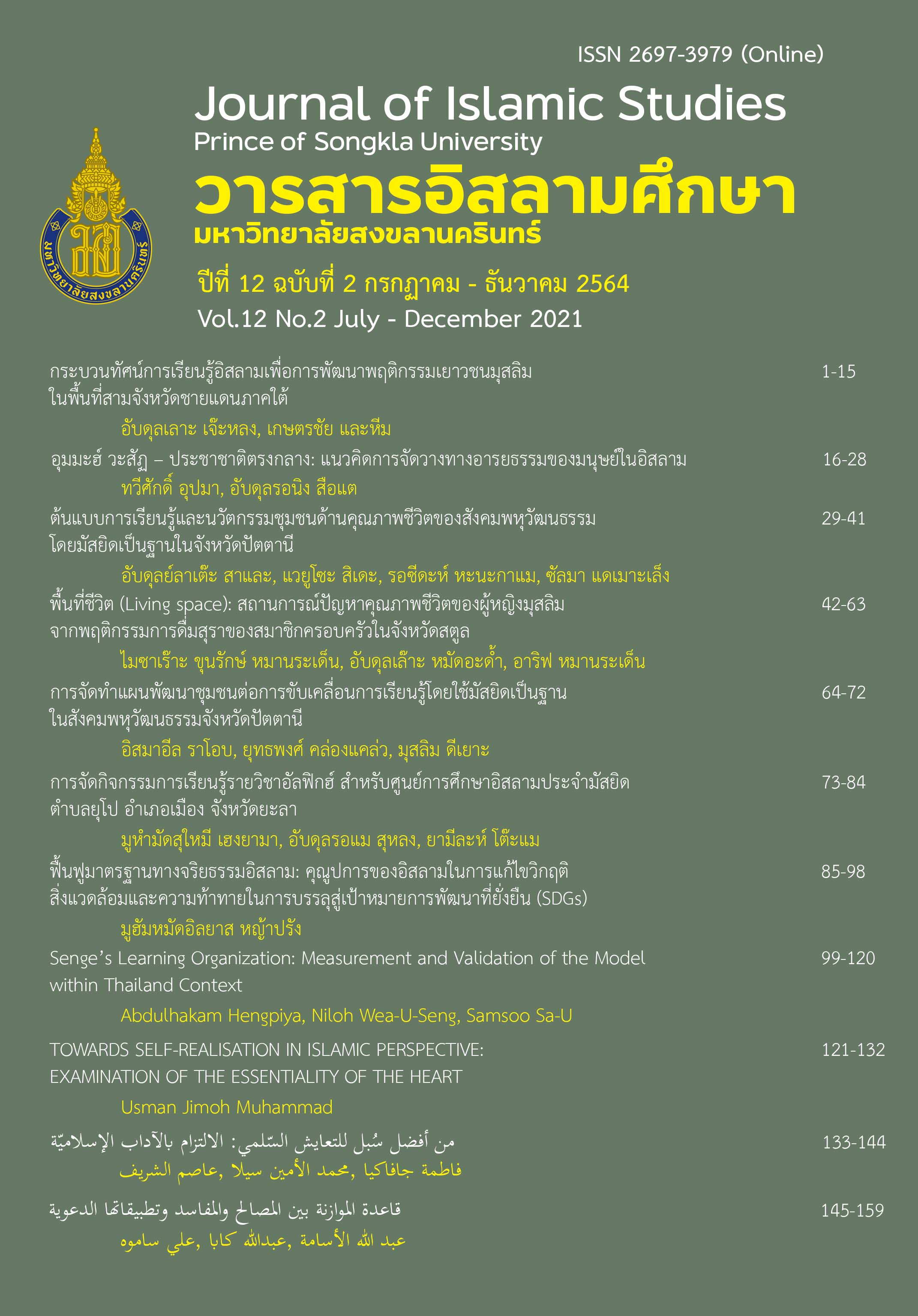Islamic Learning Paradigm for the Development of Muslim Youth Behavior in the Three Southern Border Provinces of Thailand
Keywords:
Islamic learning, Muslim youth, Three Southern border provincesAbstract
Objective This research aims to study Islamic Learning Paradigm for the Development of Muslim Youth Behavior in the Three Southern Border Provinces of Thailand
Methodology A qualitative approach to collecting the data through documentary analysis, interview, and focus group discussion. Data from 2 focus group discussions, 8 Muslim youth leaders in the three southern provinces and 8 Muslim leaders, are presented in descriptive analysis.
Research findings The research found that the Holy Qur'an and the verses of the Prophet Muhammad (al-Hadith) are the fundamental of Islamic learning with AKHLAQ (Principles of Ethics), IBADAH (Principles of Integrity), SHA’RIAH (Principles of Islam), AKIDAH (Principles of Faith), and IHSAN (Excellence) as the way of life. Promoting Muslim youth learning in all dimensions with self-management and self-control under Islamic concepts and having methods of religious activities using community as learning reinforcement empower become a paradigm of Islamic learning to develop Muslim youth behavior in the three southern border provinces of Thailand.
Applications The organizations and personnel who are responsible for supervision and develop Muslim youth in Three Southern Border Provinces can apply the outcomes of the study in planning policies, strategies, and curriculum for Muslim youth development in accordance with the beliefs, values and Islamic paradigms.
Keywords: Islamic learning, Muslim youth, Three Southern border provinces.
References
Athikiat, K. and Sarthueankaew, T. (2007). kānsō̜n bǣp thansamai læ teknik withī sō̜n nǣo mai. [Modern teaching and innovative teaching techniques]. Retrieved 29 March 2021 from https://regis.skru.ac.th/RegisWeb/webpage/addnews/data/2017-07-24_078.pdf
Bunnamudom, P. (2020). hō̜ng rīan nai fan khō̜ng kānsưksā satawat thī yīsipʻet: botbāt samkhan khō̜ng hō̜ng rīan nai kān songsœ̄m kānrīanrū nai lōk samai mai. [Dream classroom in 21st century education: the role of classroom in Promoting in the New World]. Retrieved 28 January 2021 from https://www.educathai.com/knowledge/articles/123
House of Senate Education Standing Committee. (2020). Khō̜sanœ̄ chœ̄ng nayōbāi rēngdūan wādūai kānbō̜rihān čhatkān sưksā ʻēkkachon nai chūang sathānakān kān rabāt khō̜ng rōk titchư̄a wairat khōrōnā sō̜ngphansipkāo (covid-19) thī mo̜som kap sangkhom Thai. [Urgent appropriate Policy recommendation on Private Education management in the Pandemic Covid-19 for Thai Society]. Bangkok: Office of Standing Committee 3, Office of House of Senate Secretary.
Jantharakantee, A. (2014). The Development of Pre-Service Science Teachers’ Attitude about Teacher Characteristics by Using Case Study of Teacher Somporn who Teaches Monkeys. Silpakorn University Journal, 34(1), 161-179.
Khemmanee, T. (2010). Sāt kānsō̜n: ʻongkhwāmrū phư̄a kānčhat krabūankān rīanrū thī mī prasitthiphāp. [Teaching Science: Knowledge for Effective learning Process]. Chulalongkorn Univ ersity Publisher.
Kumsuprom, S. (2020 May, 5). phœ̄i kān rīankān sō̜n rabop online chalui hēt dek keng technology. [Revealing the qualitative online teaching system Why kids are good at technology]. Retrieved 22 December 2020 from https://www.thaipost.net/main/detail/65137
Ministry of Education. (2020). Nǣothāng kānčhatkān rīan kānsō̜n khō̜ng rōngrīan sangkat samnakngān khana kammakān kānsưksā naphư̄n thān nai sathānakān kān phrǣ rabāt khō̜ng rōk titchư̄a wairat khōrōnā sō̜ngphansipkāo (COVID-19) pīkānsưksā 2563. [Teaching management approaches in schools under the Office of the Basic Education Commission in the Pandemic Covid-19 for academic year 2020]. Office of the Basic Education Commission.
Pinyosinwatt, P. (2020, May, 7). čhatkān rīan kānsō̜n yāngrai nai sathānakān khō wit - 19: čhāk botrīan tāngprathēt sū kānčhatkān rīanrū khō̜ng Thai [How to manage teaching and learning in the Pandemic Covid-19: Lesson learn from abroad to Thai learning management]. Retrieved 16 December 2020 from https://tdri.or.th/2020/05/examples-of-teaching-and-learning-in-covid-19-pandemic/
Prachāchāt online. (2020, June, 16). Globish phœ̄i sī new normal nǣothāng kānsưksā Thai [Globish declared four New Normal Thai Educational Approaches]. Retrieved 28 December 2020 from https://www.prachachat.net/education/news-478376
Sittisamarn, S. (2020, July, 1). Rīan bǣp New Normal kō̜ tō̜ng plīan withī pramœ̄n dūai [New Normal Learning style must change evaluation method too]. Retrieved 19 November 2020 from https://mgronline.com/qol/detail/9630000067379
Tongkaew, T. (2020). New Normal Based Design in Education: Impact of COVID-19. Journal of Teacher Professional Development, 1(2), 1-10.
Wongyai. V. and Pattapol, M. (2020). Kānpramœ̄n kānrīanrū New normal. [Learning Assessment in New Normal]. Postgraduate Srinakharinwirot University.
Wongyai. V. and Pattapol, M. (2020). New normal thāngkān rīanrū [Learning in New normal]. Postgraduate Srinakharinwirot University.
Downloads
Published
How to Cite
Issue
Section
License
Copyright (c) 2021 Journal of Islamic Studies, Prince of Songkla University

This work is licensed under a Creative Commons Attribution 4.0 International License.
All articles Published in The Journal of Islamic Studies are author’s opinions, and not the responsibility of the Faculty of Islamic Sciences nor the editorial board. However any citation should be referred to the journal.
















